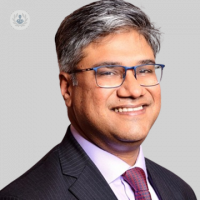What we need to know about gallstones
Written in association with:In this article below, revered consultant general and hepato-pancreato-biliary surgeon, Mr Deepak Hariharan, discusses gallstones in expert detail, outlining the associated symptoms and causes, and advising when medical attention is required.

What are gallstones, and what are the symptoms of gallstone formation?
The precipitation of firm to hard material due to absorption of water within the gallbladder leads to formation of stones. The gallbladder is a pear-shaped bag lying beneath the liver whose function is to concentrate bile produced in the liver and release concentrated bile on demand.
Bile is an emulsifier and aids fat absorption within the gastrointestinal tract. The predominant content of bile is cholesterol and cholesterol stones are the most common type of gallbladder stone.
The main symptoms of gallstones are recurrent pain in the upper abdomen often centrally and underneath the right rib cage. The pain is made worse after eating rich fatty meals and is often associated with bloating, nausea, and aversion to rich oily meals. This symptom complex is referred to as biliary colic. Occasionally. the pain is associated with fevers, excruciating pain, with or without jaundice, mandating emergency hospital admission.
How are gallstones diagnosed, and what tests are commonly used to detect them?
An ultrasound scan of the abdomen is the ideal test to detect gallstones. Qualified medical personnel establish diagnosis after taking a detailed medical history confirming presence of upper abdominal pain. Blood tests are also used.
What are the complications of untreated gallstones, and how serious can they be?
A significant proportion of the population (80 percent) known to have gallstones have no symptoms (asymptomatic) and mandate no medical attention or treatment if they are asymptomatic. However, awareness is essential as those that are symptomatic (20 percent) need to consider seeking medical help as there is a 20 percent cumulative risk year on year that patients may develop worsening symptoms or complications.
The complications of gallstones include:
There are many complications associated with untreated gallstones. They include:
- Recurrent biliary colic
- Acute cholecystitis
- Biliary peritonitis
- Liver abscess
- Obstructive jaundice without sepsis
- Cholangitis
- Mirrizi syndrome
- Gallstone ileus
- Acute pancreatitis
What is the importance of early detection of gallstones, and how does it impact treatment options?
The presence of gallstones alongside awareness of its symptoms and attention to symptom progression is essential to pre-empt development of severe, life-threating complications. Once symptoms develop, it is advisable to seek medical help from appropriate medical personnel.
In the presence of symptoms and established diagnosis of gallstones, an early prompt referral to competent surgeon is advised. Surgery in the form of cholecystectomy (gallbladder removal in total with stones) done laparoscopically (keyhole) is the only modality of treatment.
Are there any natural remedies or lifestyle changes that can help prevent gallstone formation?
There remain no natural remedies or lifestyle changes one can undertake to prevent or treat gallstones.


